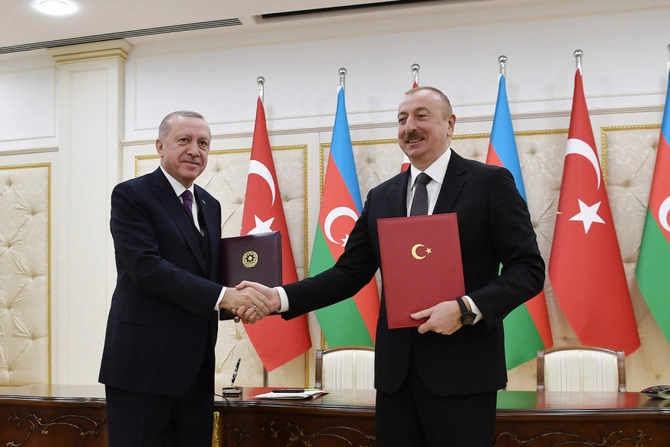
By Tural Heybatov
Work has begun on the implementation of the Kars-Iğdır-Nakhchivan railway project.
The project includes the construction of a 223.9 km railway line and is expected to be completed within five years. Meanwhile, Azerbaijan has completed the feasibility study for the reconstruction of the railways of the Nakhchivan Autonomous Republic and continues with project planning. The Azerbaijan Railways (AŽD) has informed journalists that construction will begin once the design phase is completed. The goal is to create a railway network that meets all modern standards, ensuring the safe and timely transportation of passengers and cargo. Once the Kars-Nakhchivan railway is operational, this line will become a branch of the Middle Corridor. The new railway will also be integrated with the Baku-Tbilisi-Kars railway.
Türkiye plans to complete and commission the railway within five years. The double-track railway will include five stations, along with the construction of ten bridges and other infrastructure. The Kars-Iğdır-Aralık-Dilucu-Sadarak-Nakhchivan-Julfa railway will be part of the Middle Corridor and will turn the Nakhchivan Autonomous Republic (NAR) into a key regional transit hub.
The implementation of this project will enhance the export capabilities of NAR and transform it into a major transit center, providing access to China, Europe, and the Persian Gulf region. Broadly speaking, this could mark the creation of a Railway Silk Road. Completion of the project will significantly contribute to the economic potential of the region, including boosting trade between Türkiye and Azerbaijan. The railway’s projected annual capacity is expected to reach 5.5 million passengers and 2 million tons of cargo.
Once the railway is operational, travel from Kars to the Dilucu border checkpoint with Azerbaijan will take just 85 minutes. The Kars-Iğdır railway is being built by Turkish companies Kalyon and Cengiz İnşaat, which, according to Turkish media, have already employed hundreds of specialists for the project.
It should be recalled that on February 25, 2021, in the presence of Presidents Ilham Aliyev and Recep Tayyip Erdoğan, a Memorandum of Understanding was signed between the governments of Azerbaijan and Türkiye for the Kars-Iğdır-Aralık-Dilucu-Sadarak-Nakhchivan-Julfa railway project. Ilham Aliyev described this as a historic event, stating, "I am confident that this project will be successfully implemented and will serve the interests of Azerbaijan, Türkiye, and other countries as part of the Middle Corridor."

Zangezur Corridor Gains Momentum
Notably, the Zangezur Corridor project, which many had doubted, is now beginning to take shape. Positive signals are also coming from Yerevan. A key factor in this shift is Armenia’s interest in restoring a railway connection to Türkiye via Nakhchivan, a topic Prime Minister Nikol Pashinyan has repeatedly addressed. The Armenian prime minister has hinted at his desire to restore the Yeraskh-Nakhchivan and Gyumri-Kars railway lines.
While Armenia hesitates, construction of the South Araz Corridor-connecting Azerbaijan’s western border to NAR via Iran-continues. If Armenia agrees to the Zangezur Corridor, it could also become part of this regional process. In reality, the corridor would be highly beneficial for Armenia itself. However, political fears and speculation have so far prevented Yerevan from fully recognizing this. Nevertheless, Nikol Pashinyan has included the Zangezur route in his “Crossroads of Peace” initiative, which he promotes globally. Initially, Armenia proposed alternative routes for Azerbaijan’s connection to NAR, but they were unsuitable for various reasons. Now, based on the maps Pashinyan presents, it appears that Yerevan is gradually accepting the inevitability of the Zangezur Corridor-especially now that Türkiye is linking its railways with Azerbaijan’s.
For Azerbaijan, whether the railway from Aghbend to NAR passes through Iran or Armenia is of little consequence. In either case, Azerbaijan’s railway network will connect to Türkiye’s.
Ideally, all regional transportation routes should be reopened. The South Caucasus' transport networks are interconnected, and if all roads are operational, Azerbaijan and neighboring countries will be able to transport passengers and cargo in all directions. Every country in the region could benefit from these railways, earning revenue from transit and increasing trade. However, if Armenia remains absent from this process, alternatives will be pursued. Azerbaijan has already developed one alternative in the north via the Baku-Tbilisi-Kars railway, while another is actively being built in the south through Iran. Something suggests that discussions on the Zangezur Corridor will soon accelerate as well-because it benefits all parties involved.
Share on social media